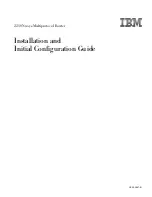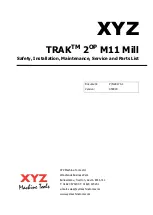
About Internet Protocol Security (IPSec)
Digi TransPort User Guide
392
X.509 Certificates
In the previous section, security between two points was achieved by using a “pre-shared secret”
or password. Certificates provide this sort of mechanism but without the need to manually enter
or distribute secret keys. This is a complex area but put simply a user’s certificate acts a little like
a passport providing proof that the user is who they say they are and enclosing details of how to
use that certificate to decrypt data encoded with it. Passports however can be forged so there
also needs to be proof that the passport has been properly issued and hasn’t been changed since
it was. On a paper passport this is achieved by covering the photograph with a coating that shows
if it has been tampered with, embedding the user’s name in code in a long string of numbers, etc.
In the same way, for a Security Certificate to be genuine it has to be protected from alteration as
well. Like a passport, you also have to trust that the issuer is authorized and competent to create
the certificate.
Certificates use something called a “Public/Private Key Pair”. This a complex area but the principle
is that you can create an encryption key made up from two parts, one private (known only to the
user), the other public (known to everyone). Messages encrypted with someone’s public key can
only be recovered by the person with the Public AND Private key but as encrypting the message
to someone in the first place only requires that you know their public key, anyone who knows
that can send them an encrypted message, so you can send a secure message to someone
knowing only their publicly available key. You can also prove who you are by including in the
message your “identity” whereupon they can look up the certified public key for that identity and
send a message back that only you can understand. The important principles are:
• Your private key cannot be determined from your public key.
• You both need to be able to look up the other’s certified ID.
Once you have established a two-way secure link, you can use it to establish some rules for
further communication.
Before this gets any more complicated, let us assume Digi International is a competent authority
to issue certificates, and examine how certificates are used.
Generally, the issuing and management of certificates will be provided as a managed service by
Digi or its partners, but some general information is provided here for system administrators.
Certificates are held in non-volatile files on the router. Any private files are named
privxxxx.xxx
and cannot be copied, moved, renamed, uploaded or typed. This is to protect the contents. They
can be overwritten by another file, or deleted.
Two file formats for certificates are supported:
•
PEM
: Privacy Enhanced MIME
•
DER
: Distinguished Encoding Rules
Certificate and key files should be in one of these two formats, and should have an extension
of.
pem
or
.der
respectively.
Note
The equivalent filename extension for.pem files in Microsoft Windows is
.cer
. By
renaming
.pem
certificate files to
.cer
, it is possible to view their makeup under Windows.
















































